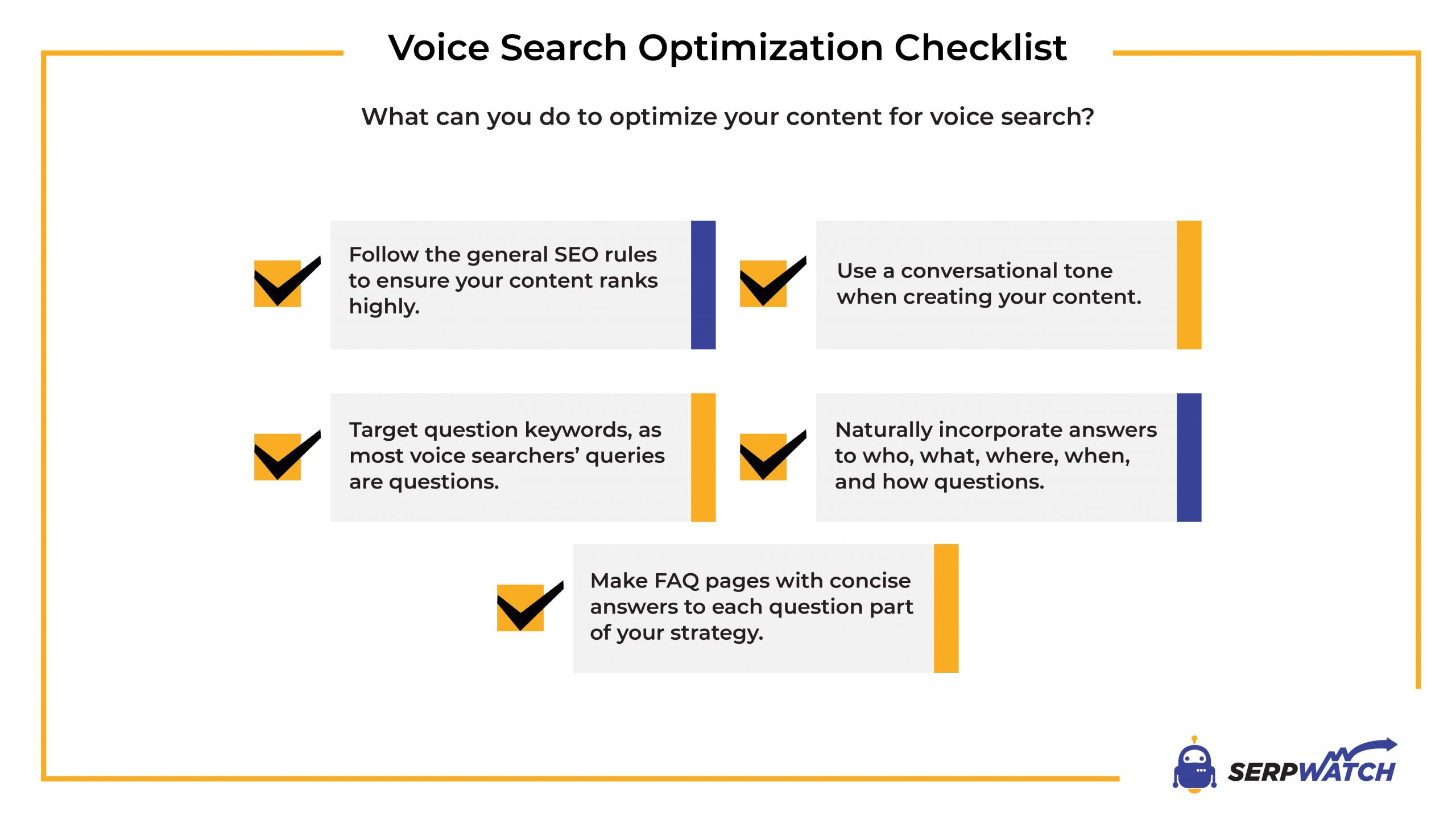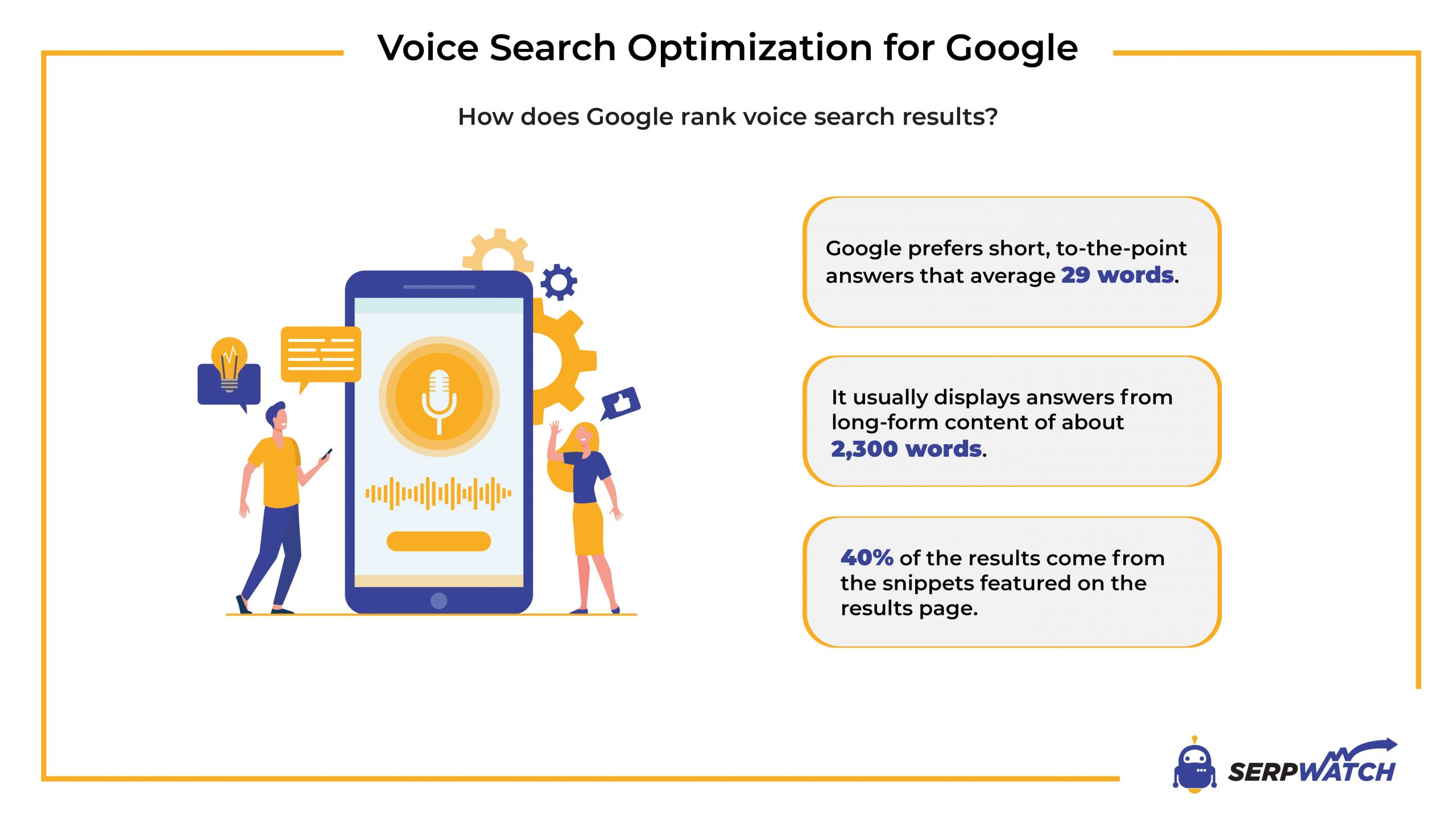
How to Optimize for Voice Search: Best SEO Practices in 2024

Voice search is a technology that allows users to browse the web and use voice commands to control their smart devices, such as smartphones, smart speakers, kitchen appliances, and many others.
With voice assistants like Alexa, Cortana, Siri, and Google Assistant becoming more popular each year, it’s essential to prepare your website and optimize it for voice search. For that reason, we’ve prepared a short guide on voice optimization to help you improve your voice search SEO.
Find in this article:
- How to prepare your website for voice search?
- What are the basics of voice search?
- How to create an SEO strategy for voice search?
- How can your business benefit from voice search?
- What search engines do voice assistants like Alexa use?
- What is the future of voice search and SEO?
How to Optimize for Voice Search
If you wish to optimize your website for voice search, the good news is that it’s similar to optimizing for traditional text search. That means optimizing for voice search will benefit your SEO strategy in general. Therefore, you can and most certainly should apply general SEO practices when optimizing your website for voice search. This includes improving your website’s domain authority, link-building strategy, and even page load time since you can lose 7% in conversion if your website takes just one second longer to load.
The good idea is to use CSS3 or HTML5 frameworks to ensure mobile web pages load quickly. This is especially important for voice search since most voice queries occur on smartphones.
So, apart from general SEO practices, let’s answer the question, “how do I optimize for voice search exactly?”
First things first, you should start by creating a strategy and research keywords relevant to your business, which depends on the product or service your business offers. To do so, you can use some of the best SEO tools available to you, such as SerpWatch, that make the process significantly smoother by helping you find and track relevant keywords, monitor rankings across multiple platforms, and much more.
However, before you start with voice engine optimization, an important thing to know is that voice search is much more conversational than traditional search.
Namely, since modern-day voice assistants are interactive and may even ask a question or two to refine our search, we often end up having a dialogue with them. Of course, this often reflects on the way people use voice search as well. For example, with text search, we would often search for a “vanilla pudding recipe.” However, when talking to a voice assistant, we would most often use a full sentence like we normally would in a conversation. With that said, if you wish to optimize for voice search specifically, your target keyword should be “How do I make a vanilla pudding?”
An effective strategy is to use a conversational tone when optimizing your content for voice search. Additionally, because we almost always make an inquiry when using voice search, your content should include voice search FAQ pages as a part of your strategy. In other words, you should answer who, what, how, and where questions.

What Is Voice Search?
Perhaps the best way to learn how to take full advantage of voice search and use it as a part of your SEO strategy is to understand how it works.
Voice search is based on speech recognition technology that converts audio into text. As a result, all we need to do is activate our voice assistants by saying “Hey, Google” or “Hey, Siri” and ask them a question instead of typing it in a search bar.
However, modern-day voice command devices go far beyond that and are much more intuitive and capable of recognizing semantics and intent.
Namely, in today’s time, you can ask your virtual assistant, “Is it going to rain this weekend?” and it’ll recognize your intent. It’ll understand that you’re referring to the upcoming Saturday and Sunday. It will also take into account your location and provide you with a local forecast for the weekend.
Of course, this is just one example of how voice search works. Since it allows us to browse the web when our hands are busy, some popular voice search trends are asking for directions while driving or looking for recipes while meal prepping. Not only that, but users also use voice search for shopping, making general inquiries about businesses, products, services, and much more.
Additionally, many modern voice-activated devices like smart home speakers are integral parts of smart homes and can be used to control other devices. For example, you can control your TV, smart lights, smart plugs that can turn a device on or off, etc.
How to Use Voice Search for SEO?
The way you will use voice search for SEO greatly depends on your business. Naturally, your entire strategy and keyword research should be centered around the product or service your business offers. However, in addition to that, there are several things you should consider that can make your SEO strategy a lot more successful.
A good thing to remember is that mobile plays a major role in voice search and you should put a lot of effort into optimizing your website for smartphones if you wish to improve your voice search SEO. Namely, most voice searches occur on mobile, and a high percentage of those mobile voice searches are location-based queries. Most often, users will inquire about local businesses, such as restaurants or hotels to stay at, and will look up the address, opening hours, and similar information.
For that reason, you should make sure to optimize for the so-called near me searches, and one of the easiest ways to do that is to create and update your Google My Business listing.
Another aspect of voice search and how it affects SEO efforts is FAQ pages and their structure. Namely, your FAQ pages should feature specific words and phrases. If structured well, the FAQ page will give all the right answers to common questions. Additionally, make sure to target long-tail keywords, which we often use when doing a voice search. They also help complete questions and answers.
The reason this is crucial for anyone who wishes to learn how to optimize for voice search is that around 40% of all voice assistant answers come from featured snippets. In other words, the more relevant questions and better answers on your FAQ page you have, the higher the chances of ranking better.
Furthermore, the latest voice search statistics show that Google prefers concise answers that are around 29 words long and come from long-form content of about 2,300 words. Additionally, Google prefers rich answers taken from websites that rank high.

What Can Voice Search Do?
SEO is one of the most effective digital marketing strategies, and its goal is to increase traffic to your website. Naturally, since voice search and traditional search go hand in hand, voice search can also help you increase organic traffic to your website, especially if you run a local business.
Naturally, the amount of traffic you may receive from voice search will also depend on your website’s rankings. So, to ensure the best results and that your voice search optimization campaign is effective, you should first ensure that your entire website is well-optimized before focusing on optimizing for voice.
Of course, while the increased traffic is potentially the biggest benefit of voice optimization, there’s more to it. You’ll be able to generate more leads and additional revenue thanks to the increase in traffic.
Another reason you should start optimizing for voice search is that voice search is on the rise. According to Statista, around 8.4 billion digital voice assistants will be in use by 2024, which is a significant jump from 4.2 billion in 2020. With all the information pointing out that the number of voice searches will increase in the upcoming years, optimizing for voice search today is a way to stay ahead of the curve.
What Search Engine Does Alexa Use?
Even though Amazon’s Alexa is one of the most popular voice assistants on the market, it doesn’t support Google’s search engine. Instead, Alexa uses Bing as a designated search engine for answering questions and providing users with information. Therefore, if you wish to optimize your website for voice search, you might want to consider creating an SEO strategy that caters to Bing rather than Google.
The good news is that, while there are some differences between Bing and Google SEO, there are also plenty of similarities between the two. So, if you already have a strategy in place, you won’t have to deviate from it and create a specific strategy for Amazon Alexa’s search engine.
When it comes to Bing and Google in particular, some of the differences between the two is that Bing places more emphasis on websites that use multimedia, such as photos or videos. Additionally, Bing is more focused on precise keywords rather than the context.
Of course, if you wish to create a strategy for a specific search engine, you can always do research and find out which voice assistant is popular in your area. Once you obtain that information, you can find out what search engine that voice assistant uses and create a voice search optimization strategy specifically for that search engine.
Naturally, when creating a strategy and deciding on the content you will use to optimize your website, you can always use tools like SerpWatch to do the heavy lifting for you. Regardless of the search engine you optimize content for, SerpWatch will allow you to research keywords across multiple search engines, such as Google, Bing, Yandex, Amazon, and others.
How Can Google Voice Search History Affect Search Results?
Google is by far the most popular search engine in the world, processing around 100 billion searches every single month. Even though users don’t technically spend a lot of time on Google, they frequently use it to find information. However, did you know that two different users can search for the same thing and get two entirely different results?
Of course, while the results may not differ drastically, some websites may have priority over others for a specific user based on their previous Google voice searches or cookies on their device. Additionally, the user’s location may also affect the results, which is yet another reason why businesses should optimize for local searches.
As we briefly mentioned earlier, modern-day voice assistants are intuitive. Even though we can’t personalize or edit their “persona,” they continuously learn and adapt to our needs by reading cookies and our search history. In fact, even Google Voice Local Search app from 2007 offered different results based on location, so it shouldn’t come as a surprise that new devices are a lot more intuitive and offer different results based on previous searches.
However, even though companies like Google have made a fortune by collecting data and selling it to other websites, you don’t have to analyze said data to conclude that consumers in your area shop locally.
What Does Voice Search Mean for the Future of SEO?
There’s no denying that voice search is gradually becoming a bigger part of SEO and users’ lives. As the technology becomes even more intuitive and widespread, the number of people who use voice search regularly will most certainly increase.
Granted, while voice search won’t entirely replace traditional search any time soon, the successful history of voice search indicates a promising future for voice search. In other words, businesses should start preparing for the upcoming changes and adapt to the latest trends by optimizing their websites for voice search, which is especially important for businesses that operate locally.
However, there’s no need to panic about the upcoming changes. While voice search and its surging popularity will undeniably affect the future of SEO, these new changes won’t force website owners to rethink the content. In fact, since voice search SEO benefits greatly from general SEO practices and voice assistants derive queries from written content, traditional optimization is bound to thrive and become even more relevant in the future.
Summary
As we noted before, voice search is growing in popularity, which is just one of the reasons businesses should get ahead of the competition and start optimizing their websites for voice search.
We answered the question, “how does voice search work?” and hopefully helped you understand how to optimize your site for voice search. Moreover, since voice search queries mostly come from featured snippets, your strategy should involve restructuring your content and adding a FAQ page to your website.
Additionally, you should target long-tail keywords with the help of advanced rank trackers like SerpWatch. You can use them to research and track relevant keywords, analyze your competition, and much more.
Finally, don’t forget to focus on general SEO practices since one of the best ways to improve your voice search SEO is to improve website SEO and ensure your FAQ pages provide users with relevant information.
Sources






There are currently no comments.
Be the first!))